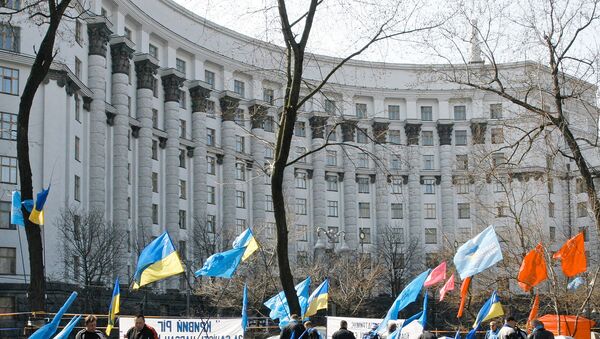MOSCOW, October 22 (RIA Novosti), Daria Chernyshova - France, Germany and Poland, signatories to the February 21 agreement on the Ukrainian crisis settlement, should bear responsibility for Kiev not fulfilling its obligations, the head of the Center for German Studies at the Russian Academy of Sciences, said Wednesday.
"Having signed that agreement, you [Germany, France and Poland] took over the responsibility for the future of Ukraine, and if you say that Russia bears responsibility for eastern Ukraine, than the European Union and the United States are responsible for the west of Ukraine, and if Kiev does not fulfill its obligations, the EU should act," Vladislav Belov said during a video conference on the Ukrainian crisis settlement held at Rossiya Segodnya International Information Agency.
On February 21, Ukrainian opposition and the then President of Ukraine Viktor Yanukovych signed an agreement on resolving the crisis in Ukraine in the presence of the foreign ministers of Germany, France and Poland.
"The foreign ministers of France, Germany and Poland welcome the signing of the agreement on the settlement of the crisis in Ukraine, commend the parties for their courage and commitment to the agreement and call for an immediate end to all violence and confrontation in Ukraine," the foreign ministers' joint statement said.
However, the obligations Kiev undertook were not implemented. Kiev noted that economic reforms were not conducted, and there was no fight against corruption.
"So in theory, the West should be punished as Russia, for Kiev not meeting its obligations," Belov said.
He also noted that Kiev's hopes to join the European Union are vain.
"Ukraine will be trying to join the European Union, but it has a small chance of meeting Copenhagen criteria, those 35 chapters that should be discussed and implemented," Belov stressed.
The Ukraine-European Union Association Agreement is a treaty that presupposes political and economic association between the parties.
The political provisions of the agreement were signed in March, after Yanukovych was ousted. Petro Poroshenko signed the economic part of the agreement in June.
On September 12, Russia, Ukraine and the European Union reached a compromise on Kiev's free trade pact with the 28-member bloc, postponing its entry into force until the end of 2015. The deal was reached during a trilateral meeting in Brussels, which was held after Moscow had expressed concerns that the implementation of the treaty carried economic risks for Russia and Ukraine.
Moscow warned Kiev that Ukraine's signing of a free trade agreement with the European Union could trigger an uncontrolled flow of duty-free goods from Europe, forcing Russia to protect its market.

